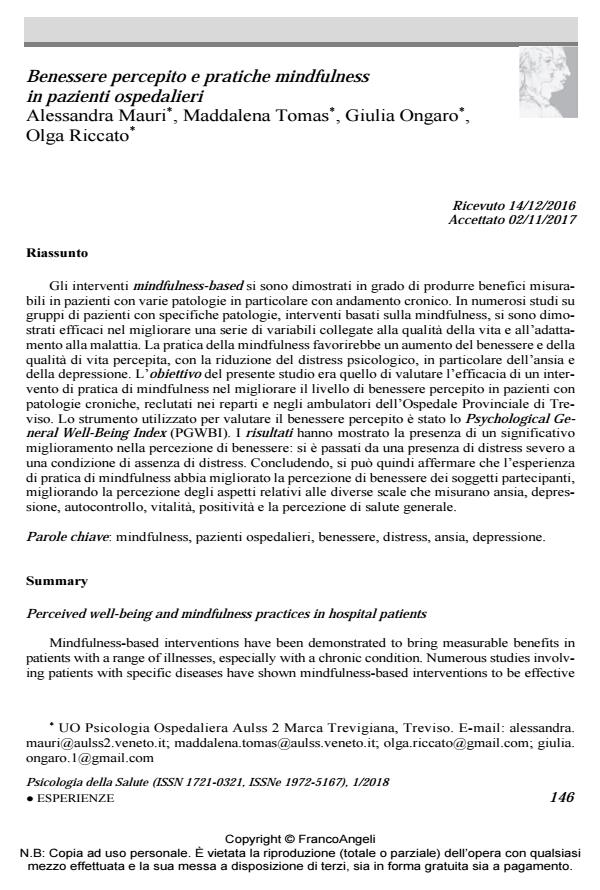Perceived well-being and mindfulness practices in hospital patients
Journal title PSICOLOGIA DELLA SALUTE
Author/s Alessandra Mauri, Maddalena Tomas, Giulia Ongaro, Olga Riccato
Publishing Year 2018 Issue 2018/1
Language Italian Pages 14 P. 146-159 File size 214 KB
DOI 10.3280/PDS2018-001009
DOI is like a bar code for intellectual property: to have more infomation
click here
Below, you can see the article first page
If you want to buy this article in PDF format, you can do it, following the instructions to buy download credits

FrancoAngeli is member of Publishers International Linking Association, Inc (PILA), a not-for-profit association which run the CrossRef service enabling links to and from online scholarly content.
Mindfulness-based interventions have been demonstrated to bring measurable benefits in patients with a range of illnesses, especially with a chronic condition. Numerous studies in-volving patients with specific diseases have shown mindfulness-based interventions to be ef-fective in improving a series of variables related to quality of life and adjustment to the disease. Mindfulness practice would appear to promote an increase in well-being and in perceived quality of life, with a consequent decrease in psychological distress, especially levels of anxiety and depression. The aim of this study was to evaluate the efficacy of a mindfulness - based intervention in improving perceived health in patients with chronic conditions, recruited from Treviso’s hospital departments. The Psychological General Well-Being Index (PGWBI) was used to evaluate perceived well-being. The results showed a significant improvement in the perception of well-being, reflecting a transformation from severe distress to a distress-free state. In conclusion, these results suggest that, when parameters used to measure perception of anxiety, depression, self-control, vitality, positivity and general health are considered, mindfulness practice significantly improved the perception of well-being of the patients who participated in the study.
Keywords: Mindfulness, hospital patients, well-being, distress, anxiety, depression.
- Psychological Determinants of Men’s Adherence to Cascade Screening for BRCA1/2 Giulia Ongaro, Serena Petrocchi, Mariarosaria Calvello, Bernardo Bonanni, Irene Feroce, Gabriella Pravettoni, in Current Oncology /2022 pp.2490
DOI: 10.3390/curroncol29040203 - Validation of the Italian Version of the Brief Emotional Intelligence Scale (BEIS-10) Ilaria Durosini, Stefano Triberti, Giulia Ongaro, Gabriella Pravettoni, in Psychological Reports /2021 pp.2356
DOI: 10.1177/0033294120959776 - The interplay between risk and protective factors during the initial height of the COVID-19 crisis in Italy: The role of risk aversion and intolerance of ambiguity on distress S. Petrocchi, P. Iannello, G. Ongaro, A. Antonietti, G. Pravettoni, in Current Psychology /2022 pp.437
DOI: 10.1007/s12144-021-01601-1 - A 6-Month Follow-Up Study on Worry and Its Impact on Well-Being During the First Wave of COVID-19 Pandemic in an Italian Sample Giulia Ongaro, Clizia Cincidda, Valeria Sebri, Lucrezia Savioni, Stefano Triberti, Roberta Ferrucci, Barbara Poletti, Bernardo Dell’Osso, Gabriella Pravettoni, in Frontiers in Psychology 703214/2021
DOI: 10.3389/fpsyg.2021.703214
Alessandra Mauri, Maddalena Tomas, Giulia Ongaro, Olga Riccato, Benessere percepito e pratiche mindfulness in pazienti ospedalieri in "PSICOLOGIA DELLA SALUTE" 1/2018, pp 146-159, DOI: 10.3280/PDS2018-001009